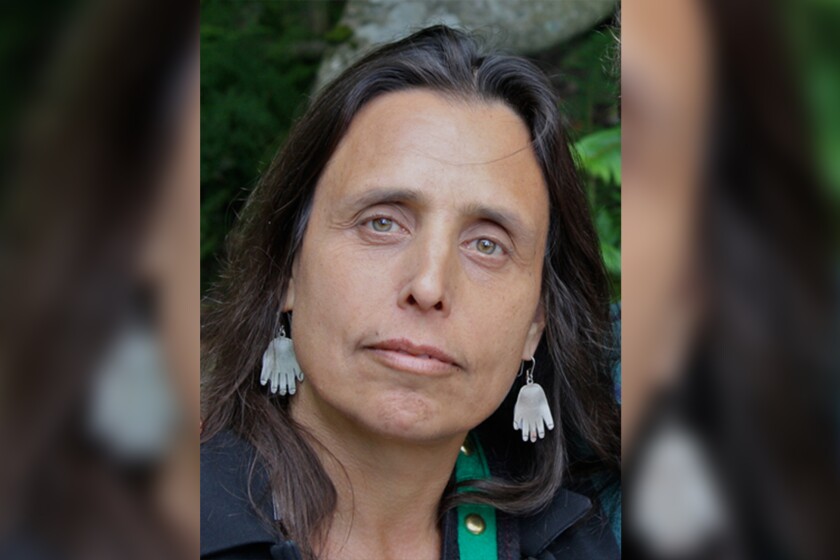Ziigwan, spring. Gathering maple sap and making syrup is the first harvest in the north country. That’s the time when the forest awakens. The maple hardwoods are a cornerstone of this ecosystem. When the frogs sing, the time of the sugarbush ends. Frogs thrive in a delicate ecosystem, half water and half land and reflect ecological wellbeing.
Omakakii is the Anishinaabe word for frog. If I were to translate the parts of that word, I would say, Omaa is here, Aki is land. The frog is from here. They do not leave. They winter by burrowing down and creating an antifreeze in their body to survive and hibernate. That’s a miracle unto itself. Medical procedures learned from the way of the frog, I’m sure of it. I bet we can learn more. Frogs live everywhere from the arctic to the desert. That’s some resilience and adaptation.
ADVERTISEMENT
For around 250 million years, frogs have survived ice ages, asteroid crashes, and epic environmental catastrophes. Today, about a third of total amphibian species are on the verge of extinction. Fifty years of dumb stuff and — poof! — they are gone. Like the great white rhino, the black rhino, and way too many species.
It’s not Darwin’s survival of the fittest theory we are seeing here, it’s greed and dumb stuff.
In the next few weeks, some lakeshore owners in northern Minnesota will begin dousing their yards with mosquito sprays, and that’s going to kill a lot of frogs. It’s not fair. Mosquito sprays are inexact as a form of warfare, sort of like carpet bombing a city — there’s a lot of collateral damage. And, frogs eat those pesky mosquitos, as do dragonflies, both of which will be injured by those sprays.
Take a clue from what we learn from frogs. Those humble creatures are teachers. What do I mean? Approximately 10% of Nobel Prizes in physiology and medicine have resulted from investigations that used frogs. When a frog species disappears, so does any promise it holds for improving human health.
There is an old Russian country practice of putting a frog into a bucket of milk to keep it from going sour. Based on this practice, modern day scientists in Russia have been studying frogs and bacteria.
“A.T. Lebedev and colleagues explain that amphibians secrete antimicrobial substances called peptides through their skin,” “These compounds make up the majority of their skin secretions and act as a first line of defense against bacteria and other microorganisms that thrive in the wet places frogs, toads, salamanders and other amphibians live.”
There are many chemicals a frog excretes. Another study found an additional 76 substances which 21 substances which “performed as well against Salmonella and Staphylococcus bacteria as some prescription antibiotic medicines.”
ADVERTISEMENT
“These peptides could be potentially useful for the prevention of both pathogenic and antibiotic resistant bacterial strains while their action may also explain the traditional experience of rural populations," the scientists concluded,
That might be helpful as “modern chemicals” are finding more and more treatment-resistant bacteria. The deal is, we probably want to keep frogs to learn the medicines. But maybe we just want to keep them because we want to keep our ecosystem. Frogs eat mosquitos, and a lot of other insects, they think they are yummy. And frogs are eaten by fish and all sorts of birds. It’s the web of life.
“Sprays can only kill mosquitos in your yard at the time of spraying. Mosquitoes typically fly 1-3 miles, so they can quickly re-populate your yard,” Deborah Landau, an entomologist (bug scientist) at The Nature Conservancy, “A commercial mosquito treatment will be more likely to kill butterflies, bees and ladybugs at the time of application than the mosquitoes you’re trying to get rid of. Mosquitos are most active at dawn and dusk, but mosquito spray companies often come during the day when most pollinators are active.”
And the chemicals used in most commercial treatments, including organic ones such as pyrethrins, are not specific to mosquitoes. They kill indiscriminately, and they run off to the water where tadpoles keep waterways clean by feeding on algae. Frogs in turn feed dragonflies, fish, snakes, birds and more. Things that end in “-cide” kill things (homicide, suicide, ecocide). I try to stay away from the -cide stuff.
There’s a frog lovers’ website at And for those of you who have seen mass frog migrations in a rainstorm: Why did the frog cross the road? Scientists report sex and food. That’s a motivator for most of us.
I have always lived with frogs. I was raised near an irrigation ditch, where the frogs would breed and make so much noise. I loved watching them turn from tadpoles to frogs, catching their wiggly bodies, showing them to little kids, watching a kid scream, and then put them back into the water. There are frogs by my house on the lake, a place full of them. Last year. There was a big toad chillaxing by my front door. I watched him roam around a bit, kept the dogs away, and still he stayed. I decided it must be a message. I gave him a kiss.
Nothing really happened, and I washed my lips off. Oh well. Anyway, save the frogs. Don’t spray a bunch of stuff which kills an ecosystem, be kind. We all need each other omaa akiing here on this earth.
ADVERTISEMENT









